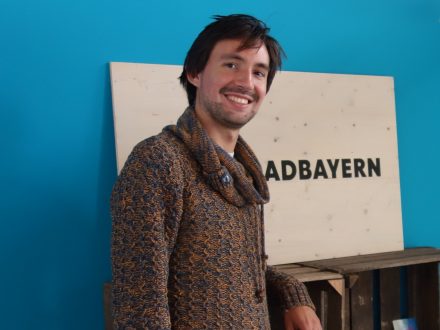All you need is a relaxed chat over a beer after work to find a new business partner or client — unfortunately, networking is rarely so instantaneous. Nevertheless, an informal exchange of ideas offers an array of opportunities. We asked some startup founders what they think about networking.
A well-known business adage says you should never eat lunch alone. That means even super-busy founders should tear themselves away from their work and have a business lunch instead of a snack in front of the computer. The idea behind it all: If you want to be successful, you need personal contacts and a dense network.
Startup culture puts particular emphasis on the great benefits of networking. It basically means that founders can meet future clients, investors or employees in passing while eating lunch or having a drink after work. After all, it never hurts to know as many people as possible — who knows what might develop from a random contact?
The number of evening networking events is correspondingly large in startup hubs like Munich. On practically every evening of the week, there are meetups, fireside chats, conferences and regulars’ tables being held. The Munich startup Mystery Lunch discovered lunch as an in-house networking tool for large companies and offers a cloud service that networks employees from different departments using an algorithm. The idea is for employees to get to know one another and exchange ideas during a shared lunch. The startup’s clients include Allianz, O2, DHL, the German Central Bank and Payback. That means even large enterprises seem to have recognized the benefit of spontaneous conversation.
Networking = a waste of time?
The spontaneity of networking is also its biggest problem: Networking costs valuable time, but you can hardly predict its value. Moreover, easy conversation is not everyone’s cup of tea. Introverts often have a tough time with small talk. Others prefer to spend the little time they have outside of work with their family and friends. As a result, lots of founders ask themselves: How much time should I invest in networking? Which events are worthwhile, and when am I just wasting my time?
Dario Nassal is one of the three founders of TheBuzzard. The platform collects different opinions, views and perspectives on a topic. The aim is to show media consumers perspectives that differ from their own. For Nassal, networking is primarily a question of time:
“There are lots of people in the startup scene who have never really done anything and are all talk. But as a founder, you need to make progress, which is why time is precious.”
Particularly in the beginning, the founders hardly had time to network:
“Especially during our six months at Media Lab, we were primarily busy building our team, developing a prototype and finding customers. That took a lot of work and was stressful, but we also made swift progress as a result.”

The licensed physician Philipp Heiler works in a completely different industry. In cooperation with his brother Tobias, Heiler founded the company Brainboost Neurofeedback. The startup analyzes its clients’ brain activity and offers coaching based on the collected data. Especially in the initial phase, Heiler said it was difficult to find time for evening events. The founders were often in the office until 8:30 pm. “At that point, lots of events are already half way through.” His recommendation is therefore:
“Especially in the beginning when time and human resources are tight, it’s better to concentrate on specific events in your own industry. And while I undoubtedly can find interesting people at general startup events to talk and share ideas with, they often don’t have what I need, and I don’t have what they need. We made better matches, for example, at physician regulars’ tables for medical professionals where startups, physicians and everyone from the medical world meet up. Then at least I know when I talk with someone that they work in my industry. That’s an important factor.”
The Brainboost team also had a very specific time issue:
“In our company, everyone who is active in management is also very involved in operative business. That often makes networking difficult. I spend a large part of my workday conducting treatments and training sessions. For our entire business development, including networking, I maybe had about ten percent of my work time left over for networking in the beginning. It was important to work efficiently.”
The value of networking often becomes evident later on
In retrospect, however, Philipp Heiler emphasized that it was worth the effort:
“But now the considerable value added by networking events is surfacing. In addition to a primary network, a secondary network is also established. And then a year later, someone contacts us whose colleague saw us somewhere at some point in time.”

That is also perhaps the crux of the matter: The benefits from time invested in networking today don’t emerge until some time in the future. Especially in the beginning, many founders seem to overlook that fact:
“Networking events are extremely important, and we underestimated that in the beginning. We tried to position our main service — neurofeedback — at events. But it still very specifically focused on medical cases and was also quite expensive at that point in time. An important step for us was developing a product, or what you might call a showcase, especially for events: a slot car race track you can steer with your brain. That attracted attention, and although it was somewhat far off from our product, you get talking with people and then often find a starting point.”
Dario Nassal from TheBuzzard related something similar:
“I think networking is definitely important. There’s no getting around it. That’s something that we maybe need to learn about more now.”
The time the media startup invested in networking has been highly dependent on the stage they were in, commented Nassal:
“While we were recruiting, for example, we tried to attend two to three events each week and took turns a bit. But then we often thought: We’d rather work on the product and talk to customers. But now we want to tackle the topic of networking more intensely because we’ve noticed how important it is.”
“Go just to have fun”
Whether or not networking yields the desired results in the end is directly linked to the nature of the event and its visitors: Stuffy rooms, drawn-out presentations and poor scheduling can be enough to put off visitors’ desire to talk and connect. And vice versa: Even the best atmosphere won’t amount to much if the attendees aren’t a good match for one another. Philipp Heiler said:
“I have great appreciation for well-organized network events. There’s always the danger of people mostly just coming by for the free beer.”
The med-tech founder also added:
“A successful event is one that yields interesting business contacts for me as a founder that then turn into uncomplicated collaboration. Forced networking where both parties really have to stretch to find a joint business case usually only lasts for a short period.”
With all that in mind, the medical expert also has a very simple recommendation to share:
“You should also sometimes just go to an event to have fun. It’s exactly with that mindset that you often strike up conversation and make an important contact without even intending to.”



